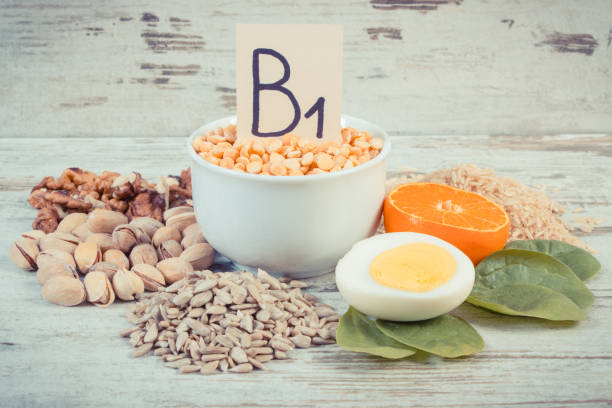Vitamin B1, also known as thiamine, plays a crucial role in maintaining good health. Here are some of the key benefits of Vitamin B1:
Energy Production
One of the primary roles of Vitamin B1 is its involvement in converting carbohydrates from the foods we eat into glucose, which the body uses as its main source of energy. This energy production is vital for the proper functioning of various bodily processes and activities.
Nerve Function
Thiamine is essential for maintaining the health of the nervous system. It plays a role in the transmission of nerve signals, which are critical for muscle contractions, sensory perception, and overall coordination.
Metabolism Support
In addition to its role in carbohydrate metabolism, Vitamin B1 also assists in the metabolism of fats and proteins. This helps ensure that all three major macronutrients are processed efficiently, aiding in overall cellular functioning.
Brain Health
Thiamine is involved in the synthesis of neurotransmitters, which are chemical messengers that allow nerve cells to communicate with each other. Adequate thiamine levels are important for cognitive functions, memory, and mood regulation.
Cardiovascular Health
Vitamin B1 contributes to the health of the cardiovascular system by assisting in the production of red blood cells and supporting the proper functioning of the heart.
Stress Management
Thiamine is known to help the body cope with stress, both physical and psychological. It is involved in the production of adrenal hormones that play a role in the body’s stress response.
Digestive Function
Vitamin B1 supports the healthy functioning of the digestive system, as it is involved in the production of stomach acid. Stomach acid is necessary for the digestion and absorption of nutrients from the foods we consume.
Antioxidant Activity
Thiamine has antioxidant properties, which means it helps protect cells from damage caused by harmful molecules called free radicals. This may contribute to overall cellular health and reduce the risk of chronic diseases.
Enhanced Muscle Function
Adequate thiamine levels are necessary for proper muscle contraction and function. This is particularly important for athletes and individuals engaged in physical activities.
Support for Special Populations
Certain groups, such as individuals with alcohol dependence or certain medical conditions, may have a higher risk of thiamine deficiency. Ensuring sufficient intake of Vitamin B1 is important for these populations to prevent related health issues.
It’s worth noting that a balanced diet that includes a variety of nutrient-rich foods, such as whole grains, lean meats, legumes, nuts, and seeds, is the best way to obtain adequate amounts of Vitamin B1 and other essential nutrients. If you have specific health concerns or conditions, it’s advisable to consult with a healthcare professional before making any significant changes to your diet or supplementation regimen.

